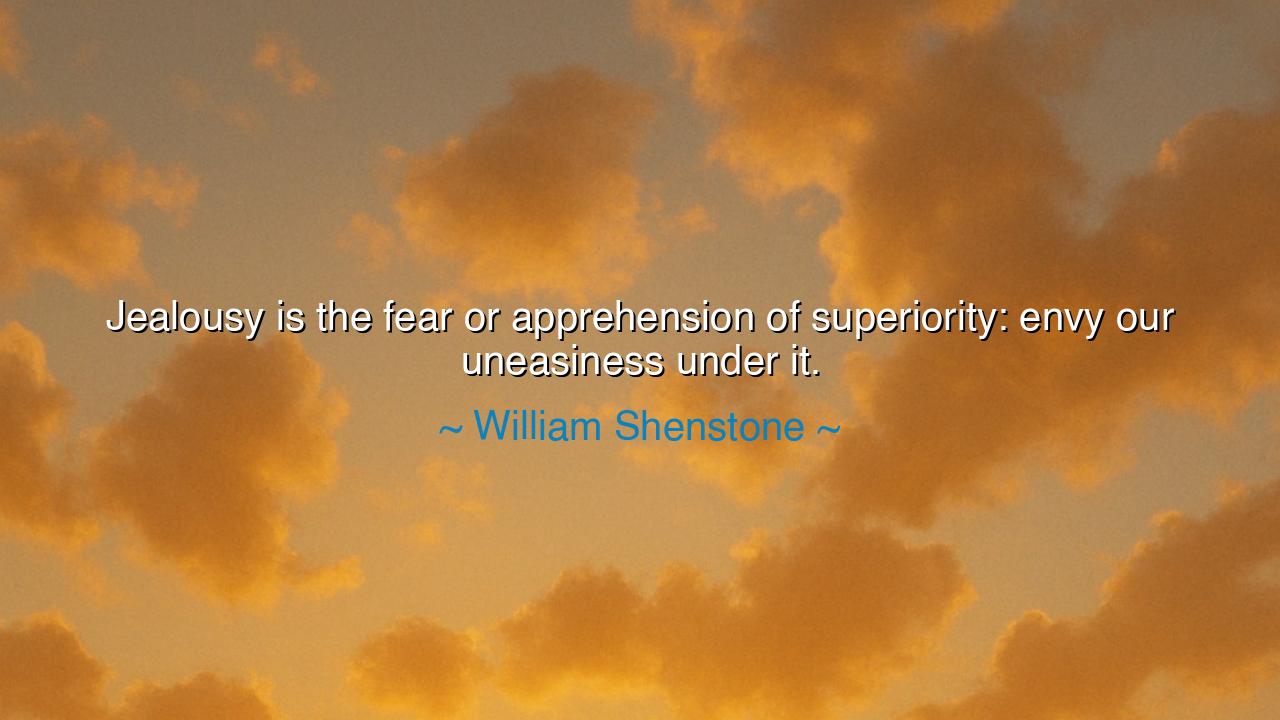
Jealousy is the fear or apprehension of superiority: envy our






There are few truths that pierce the human heart so cleanly as those that reveal its hidden motives. Among such insights stands the keen observation of William Shenstone, the English poet and moralist, who wrote: “Jealousy is the fear or apprehension of superiority: envy our uneasiness under it.” In these words, Shenstone unveils the twin poisons of the soul—jealousy and envy—and distinguishes their nature with a precision that belongs to sages. Both spring from the same root, the wounded pride of the heart, yet they bear different fruits: jealousy fears another’s rise, while envy resents it. One trembles at losing what it holds; the other burns at not possessing what it beholds.
To understand this wisdom, we must first grasp that jealousy and envy are not equal sins, though they are often mistaken as one. Jealousy arises when one fears that another’s excellence or affection will eclipse his own—that another’s light will dim his flame. It is the fear of losing superiority, position, or love. Envy, on the other hand, is quieter but no less deadly; it is the gnawing discomfort one feels at another’s success. Jealousy looks forward in fear; envy looks outward in bitterness. The jealous man says, “He must not surpass me.” The envious man says, “I cannot bear that he already has.” Shenstone, with the clarity of a philosopher and the soul of a poet, saw that both destroy peace—one through apprehension, the other through uneasiness—and both are enemies of contentment and wisdom.
Born in the 18th century, William Shenstone lived in an age that prized refinement, education, and social grace. Yet even in such polished circles, he saw how pride corroded friendship and poisoned joy. His observation came not from theory, but from the careful watching of men’s hearts. He knew that the court, the salon, and even the village were theaters of comparison, where men measured one another by rank, beauty, wealth, or wit. In that quiet rivalry of existence, jealousy and envy ruled like unseen tyrants. Thus, Shenstone’s words are not merely moral reflection, but warning: that all who seek peace must learn to conquer the restless spirit that trembles or sulks before another’s greatness.
History offers us vivid examples of this truth. Consider the tale of Cain and Abel, the first brothers born of man. Abel’s offering was accepted by God; Cain’s was not. But instead of striving to improve his own heart, Cain’s envy turned to rage. His uneasiness under Abel’s superiority grew into hatred, and hatred into murder. There, at the dawn of human history, envy first stained the earth with blood. Cain’s story is not ancient myth alone—it is the eternal drama of the soul. How many friendships have died in the shadow of envy? How many loves have soured under the weight of jealousy? Both emotions disguise themselves as passion or righteousness, but beneath them lies only pride wounded by comparison.
And yet, Shenstone’s teaching is not a condemnation, but a path toward understanding. He reminds us that these feelings—though destructive—are born of insecurity, not of evil itself. The jealous man fears that another’s greatness will reveal his own smallness. The envious man aches because he sees in another what he wishes to be. The cure, therefore, is not to harden the heart, but to enlighten it—to see that another’s success takes nothing from one’s own worth. Just as one candle does not diminish another by shining beside it, so too the greatness of others does not dim our light. To admire rather than resent, to learn rather than fear—that is the transformation Shenstone’s wisdom calls us to.
The wise throughout history have echoed this lesson. Marcus Aurelius, the philosopher-emperor, wrote that “the happiness of your life depends upon the quality of your thoughts.” To envy or be jealous is to surrender control of one’s happiness to others—to make peace depend upon their fortunes rather than one’s own virtue. The free soul rejoices in the greatness of others, for it sees in them the reflection of possibility. When another man rises, he proves that greatness is within reach; when another excels, he expands the boundaries of what humanity can be. Thus, the enlightened man does not fear superiority; he is inspired by it.
The lesson, then, is clear and eternal: guard your heart from jealousy, and cleanse your soul of envy. When you see another blessed with beauty, talent, or success, do not let fear or unease take root. Instead, let gratitude and curiosity awaken—gratitude that the world is richer for such excellence, and curiosity for what you might yet learn from it. Every act of admiration refines the soul; every act of envy corrodes it. The jealous man lives in shadows, but the one who admires walks in light.
So let Shenstone’s wisdom endure in every age: “Jealousy is the fear or apprehension of superiority: envy our uneasiness under it.” Remember that no greatness can truly threaten you if your heart is humble, and no success can sadden you if your spirit is generous. Rejoice in the triumphs of others as you would in your own, for in celebrating the greatness of humanity, you elevate yourself. Where jealousy fears and envy frets, love and wisdom flourish. And when a person has learned to replace comparison with admiration, he has at last found the secret of peace—and the freedom of a soul unchained.






AAdministratorAdministrator
Welcome, honored guests. Please leave a comment, we will respond soon